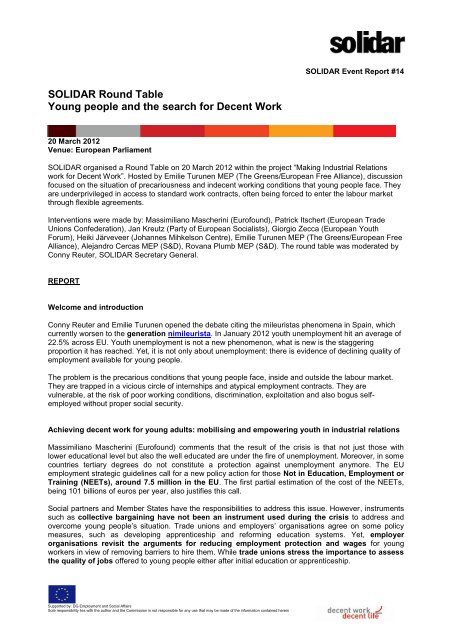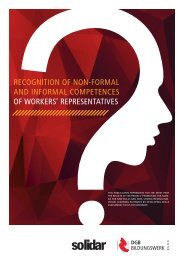SOLIDAR Round Table Young people and the search for Decent Work
SOLIDAR Round Table Young people and the search for Decent Work
SOLIDAR Round Table Young people and the search for Decent Work
Create successful ePaper yourself
Turn your PDF publications into a flip-book with our unique Google optimized e-Paper software.
<strong>SOLIDAR</strong> Event Report #14<br />
<strong>SOLIDAR</strong> <strong>Round</strong> <strong>Table</strong><br />
<strong>Young</strong> <strong>people</strong> <strong>and</strong> <strong>the</strong> <strong>search</strong> <strong>for</strong> <strong>Decent</strong> <strong>Work</strong><br />
20 March 2012<br />
Venue: European Parliament<br />
<strong>SOLIDAR</strong> organised a <strong>Round</strong> <strong>Table</strong> on 20 March 2012 within <strong>the</strong> project “Making Industrial Relations<br />
work <strong>for</strong> <strong>Decent</strong> <strong>Work</strong>”. Hosted by Emilie Turunen MEP (The Greens/European Free Alliance), discussion<br />
focused on <strong>the</strong> situation of precariousness <strong>and</strong> indecent working conditions that young <strong>people</strong> face. They<br />
are underprivileged in access to st<strong>and</strong>ard work contracts, often being <strong>for</strong>ced to enter <strong>the</strong> labour market<br />
through flexible agreements.<br />
Interventions were made by: Massimiliano Mascherini (Eurofound), Patrick Itschert (European Trade<br />
Unions Confederation), Jan Kreutz (Party of European Socialists), Giorgio Zecca (European Youth<br />
Forum), Heiki Järveveer (Johannes Mihkelson Centre), Emilie Turunen MEP (The Greens/European Free<br />
Alliance), Alej<strong>and</strong>ro Cercas MEP (S&D), Rovana Plumb MEP (S&D). The round table was moderated by<br />
Conny Reuter, <strong>SOLIDAR</strong> Secretary General.<br />
REPORT<br />
Welcome <strong>and</strong> introduction<br />
Conny Reuter <strong>and</strong> Emilie Turunen opened <strong>the</strong> debate citing <strong>the</strong> mileuristas phenomena in Spain, which<br />
currently worsen to <strong>the</strong> generation nimileurista. In January 2012 youth unemployment hit an average of<br />
22.5% across EU. Youth unemployment is not a new phenomenon, what is new is <strong>the</strong> staggering<br />
proportion it has reached. Yet, it is not only about unemployment: <strong>the</strong>re is evidence of declining quality of<br />
employment available <strong>for</strong> young <strong>people</strong>.<br />
The problem is <strong>the</strong> precarious conditions that young <strong>people</strong> face, inside <strong>and</strong> outside <strong>the</strong> labour market.<br />
They are trapped in a vicious circle of internships <strong>and</strong> atypical employment contracts. They are<br />
vulnerable, at <strong>the</strong> risk of poor working conditions, discrimination, exploitation <strong>and</strong> also bogus selfemployed<br />
without proper social security.<br />
Achieving decent work <strong>for</strong> young adults: mobilising <strong>and</strong> empowering youth in industrial relations<br />
Massimiliano Mascherini (Eurofound) comments that <strong>the</strong> result of <strong>the</strong> crisis is that not just those with<br />
lower educational level but also <strong>the</strong> well educated are under <strong>the</strong> fire of unemployment. Moreover, in some<br />
countries tertiary degrees do not constitute a protection against unemployment anymore. The EU<br />
employment strategic guidelines call <strong>for</strong> a new policy action <strong>for</strong> those Not in Education, Employment or<br />
Training (NEETs), around 7.5 million in <strong>the</strong> EU. The first partial estimation of <strong>the</strong> cost of <strong>the</strong> NEETs,<br />
being 101 billions of euros per year, also justifies this call.<br />
Social partners <strong>and</strong> Member States have <strong>the</strong> responsibilities to address this issue. However, instruments<br />
such as collective bargaining have not been an instrument used during <strong>the</strong> crisis to address <strong>and</strong><br />
overcome young <strong>people</strong>’s situation. Trade unions <strong>and</strong> employers’ organisations agree on some policy<br />
measures, such as developing apprenticeship <strong>and</strong> re<strong>for</strong>ming education systems. Yet, employer<br />
organisations revisit <strong>the</strong> arguments <strong>for</strong> reducing employment protection <strong>and</strong> wages <strong>for</strong> young<br />
workers in view of removing barriers to hire <strong>the</strong>m. While trade unions stress <strong>the</strong> importance to assess<br />
<strong>the</strong> quality of jobs offered to young <strong>people</strong> ei<strong>the</strong>r after initial education or apprenticeship.<br />
Supported by: DG Employment <strong>and</strong> Social Affairs<br />
Sole responsibility lies with <strong>the</strong> author <strong>and</strong> <strong>the</strong> Commission is not responsible <strong>for</strong> any use that may be made of <strong>the</strong> in<strong>for</strong>mation contained herein
Patrick Itschert (ETUC) explained how to better involve young <strong>people</strong> into trade unions movements,<br />
specifically <strong>the</strong> ETUC, in order to directly address <strong>the</strong>ir issues. For <strong>the</strong> first time a youth committee was<br />
part of <strong>the</strong> negotiation process with employers to draft <strong>the</strong> work programme 2012. Youth<br />
representatives were also part of <strong>the</strong> delegation to <strong>the</strong> Council <strong>and</strong> to <strong>the</strong> Commission. ETUC will also<br />
launch a campaign to organize young <strong>people</strong> <strong>and</strong> in <strong>the</strong> countries that <strong>the</strong> Commission Youth<br />
Opportunities Initiative will visit, <strong>the</strong>re will be involvement of young <strong>people</strong>.<br />
Jan Kreutz (PES), by looking at <strong>the</strong> number of <strong>people</strong> present in <strong>the</strong> room, remarked how youth<br />
employment is on <strong>the</strong> European political agenda. The Socialist party will soon publish a document<br />
highlighting twenty proposals with which improve young <strong>people</strong>’s situation. Among those (1) legally<br />
en<strong>for</strong>ceable youth guarantee, with <strong>the</strong> campaign “Your future is my future” (2) EU employment<br />
programme financed with unspent ESF money (3) an EU quality framework <strong>for</strong> internship (4)<br />
investigating if <strong>and</strong> how a dual education system could be part of <strong>the</strong> soclution to extend throughout<br />
European Member States (5) a strong alliance with partners from <strong>the</strong> civil society.<br />
<strong>Young</strong> adults’ transition <strong>and</strong> integration into quality employment – <strong>the</strong> reality<br />
Giorgio Zecca (European Youth Forum) begun his intervention warning <strong>the</strong> participants that in <strong>the</strong><br />
Commission Communications Youth Opportunity Initiative <strong>the</strong>re aren’t new funds available <strong>for</strong> <strong>the</strong><br />
measures proposed, but simply a reallocation. He <strong>the</strong>n suggested <strong>the</strong> following actions:<br />
1) Monitoring process: if a youth guarantee will be legally developed, which are <strong>the</strong> st<strong>and</strong>ards <strong>and</strong><br />
criteria? There is <strong>the</strong> need to create a common framework.<br />
2) A minimum income scheme to be applied in all Member States.<br />
3) Involvement of young <strong>people</strong> in decision making processes.<br />
4) EU charter <strong>for</strong> quality internship.<br />
5) Youth entrepreneurship might be a solution if <strong>and</strong> only if <strong>the</strong>re are complementary measures:<br />
intense <strong>and</strong> quality training, available funds, social protection.<br />
Heiki Järveveer (JMK) presented his pilot re<strong>search</strong> in Estonia. He portrayed that <strong>the</strong> main challenges<br />
young <strong>people</strong> face when entering <strong>the</strong> labour market are: lack of experience <strong>and</strong> working skills, insufficient<br />
knowledge about labour law, low wage jobs. In <strong>the</strong> country, trade unions are relatively weak, lacking<br />
funds, <strong>and</strong> young <strong>people</strong> do not feel represented by <strong>the</strong>m. Reciprocally, he remarked that even though<br />
young <strong>people</strong> are considered as a risk group by trade unions, <strong>the</strong>ir main focus is on unemployment. O<strong>the</strong>r<br />
aspects of decent work (such as low-wages) are not debated.<br />
JMK sees <strong>the</strong> responsibility of public education as well as education <strong>and</strong> social services providers<br />
to intervene <strong>and</strong> actively combat high school dropout rates, poor quality of vocational training <strong>and</strong> higher<br />
education, vocational training as a “dead-end” <strong>for</strong> those aiming at higher education, insufficient career<br />
counselling <strong>and</strong> ignorance of rights at work. Yet, a few good examples can be drawn in industrial relations<br />
practises. These practices have a pro-active approach by contacting young adults at an early stage:<br />
<strong>the</strong> development of vocational training with <strong>the</strong> involvement of social partners, lectures about labour law<br />
in <strong>the</strong> school system (by labour inspectorate), learning programmes <strong>for</strong> risk groups (low-educated young<br />
<strong>people</strong>, schools drop-outs) <strong>and</strong> programmes to re-start interrupted studies in universities.<br />
REACTIONS<br />
Emilie Turunen MEP (The Greens/European Free Alliance) outlined <strong>the</strong> two overarching principles<br />
discussed which concern young <strong>people</strong>: basic rights <strong>and</strong> labour law. She gave concrete<br />
recommendations which in her eyes will improve <strong>the</strong>ir situation:<br />
EU employment strategy just like <strong>the</strong> fiscal strategy.<br />
Youth Guarantee.<br />
Creation of an EU 2020 sub-target on youth unemployment (during <strong>the</strong> revision in 2015).<br />
Quality internship charter: EU has no legal base <strong>for</strong> biding measure but can drive MS<br />
Law en<strong>for</strong>cement as in <strong>the</strong> case <strong>for</strong> Labour Inspectors.<br />
Supported by: DG Employment <strong>and</strong> Social Affairs<br />
Sole responsibility lies with <strong>the</strong> author <strong>and</strong> <strong>the</strong> Commission is not responsible <strong>for</strong> any use that may be made of <strong>the</strong> in<strong>for</strong>mation contained herein
Specifically addressing trade unions, she called <strong>for</strong>:<br />
“Get back to basic”, unionists need to get out from <strong>the</strong>ir offices, organise young <strong>people</strong> <strong>and</strong> give<br />
<strong>the</strong>m representation.<br />
A media campaign targeting young <strong>people</strong> precarious conditions.<br />
Increase <strong>the</strong> number <strong>and</strong> enhance <strong>the</strong> role of youth wings in trade unions.<br />
Break <strong>the</strong> taboo of a dual labour market. It exists, <strong>the</strong>re are <strong>people</strong> who are inside <strong>the</strong> labour<br />
market <strong>and</strong> over-protected, at <strong>the</strong> disadvantage of those falling outside <strong>the</strong> labour market <strong>and</strong> that<br />
are not represented (e.g. in Italy <strong>and</strong> Spain).<br />
Alej<strong>and</strong>ro Cercas MEP (Group of <strong>the</strong> Progressive Alliance of Socialists <strong>and</strong> Democrats) highlighted <strong>the</strong><br />
need <strong>for</strong> actions from <strong>the</strong> institutions, granting funds, <strong>and</strong> a different society with solidarity as a core<br />
value. Rovana Plumb MEP (Group of <strong>the</strong> Progressive Alliance of Socialists <strong>and</strong> Democrats) specifically<br />
called <strong>for</strong> a new social contract. As young <strong>people</strong> have not enough trust in politicians, <strong>the</strong> EU should ask<br />
Member States to make roadmap <strong>for</strong> concrete steps such as a youth guarantee.<br />
CONCLUSIONS<br />
Conny Reuter (<strong>SOLIDAR</strong> Secretary General) launched <strong>the</strong> three pilot studies carried out by project<br />
partners FIC, JMK <strong>and</strong> LLES on young adults. He <strong>the</strong>n concluded that <strong>the</strong> EU’s tendency to flexible<br />
re<strong>for</strong>ms in labour markets has not lead to better labour market access <strong>for</strong> young <strong>people</strong>, where<br />
st<strong>and</strong>ard contracts are being replaced <strong>and</strong> young <strong>people</strong> are disproportionally represented in precarious<br />
jobs. For this reason, pro-active protection of young adults’ working rights is required. This calls <strong>for</strong><br />
policies <strong>and</strong> practices approaching young adults at an early stage (in schools <strong>and</strong> universities, in<br />
transition to labour market) <strong>and</strong> involving new <strong>for</strong>ms of organisations such as networks, social movements<br />
<strong>and</strong> NGOs.<br />
Youth/civil society organisations have an increasingly important role in representing young<br />
<strong>people</strong>, outside of <strong>the</strong> social partners’ dimension. It is crucial to start building trust between trade<br />
unions <strong>and</strong> young <strong>people</strong> at an early stage of <strong>the</strong>ir education/training <strong>and</strong> to foster young <strong>people</strong>’s<br />
knowledge on labour laws (see presentation on labour inspectors in Estonia). Last but not least, although<br />
self-employment of young <strong>people</strong> might contribute to reducing unemployment, this will not solve <strong>the</strong><br />
problem. It can easily lead to poor working conditions including permanent self-exploitation, insufficient<br />
social protection, debts <strong>and</strong> bankruptcy.<br />
Supported by: DG Employment <strong>and</strong> Social Affairs<br />
Sole responsibility lies with <strong>the</strong> author <strong>and</strong> <strong>the</strong> Commission is not responsible <strong>for</strong> any use that may be made of <strong>the</strong> in<strong>for</strong>mation contained herein
















